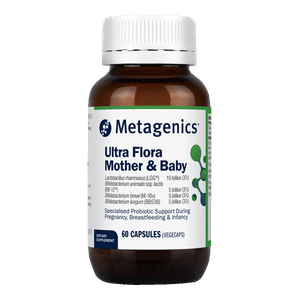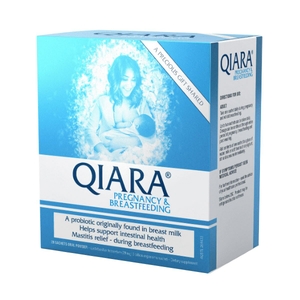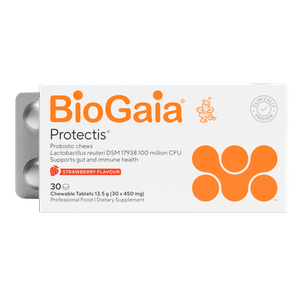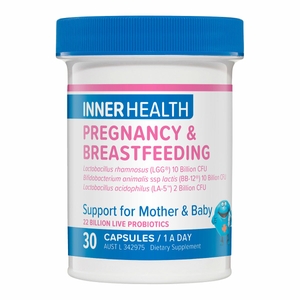
Probiotics are live microorganisms, usually bacteria, that offer a variety of health benefits when consumed. The potential benefits for breastfeeding mothers and their babies are being increasingly studied.
Evidence suggests that probiotics can be an effective supplement for both you and your baby. Product quality and the suitability of a probiotic for your specific health condition are important considerations.
It’s important to note that breast milk is the ideal source of nutrition for your baby and a source of beneficial bacteria for their developing gut microbiome (1,2,3).
Health benefits for mothers
A diverse and healthy gut microbiome during breastfeeding is important for healthy mood and immune system function, adequate digestion and nutrient absorption, and regulation of metabolic health. The use of probiotics can be a safe and effective way to improve your microbiome health.
Research shows that probiotics may provide numerous health benefits in pregnancy and breastfeeding, such as a reduced risk of diarrhoea (4), gestational diabetes (5), postpartum depression (6) and mastitis (7).
Probiotics can promote good digestive health during breastfeeding. A healthy balance of gut bacteria can help support digestion, absorption of nutrients, and elimination of waste (8).
The transfer of nutrients to your baby through breast milk is supported by a healthy gut microbiome. This can positively influence your baby’s developing microbiome (9).
Strong evidence suggests that probiotics may help reduce the risk of digestive issues, such as diarrhoea, in breastfeeding mothers and their babies (4,10).
Recent evidence also shows that probiotics help improve the balance of good bacteria in breast milk that may have been reduced by antibiotics or other factors (11).
Probiotics for mum’s immunity
Your gut microbiome influences the development and function of your immune system. A healthy, balanced microbiome may help to regulate the immune system and reduce inflammation (12).
Probiotics can positively influence gut bacteria and digestive health, reducing the risk of infection by preventing the growth of harmful bacteria (13). They may also stimulate certain immune cells’ production and help reduce inflammation in the body, which can support immune function (14).
Current clinical evidence indicates that using probiotics can reduce the incidence of urinary tract infections (UTIs) (15). Similarly, probiotics may help to reduce the risk of upper respiratory tract infections, including the influenza and the common cold (14,16).
Mum’s gut microbiome and metabolic health
Your gut microbiome also plays a vital role in regulating your metabolic health. Low bacterial diversity in the gut has been linked to metabolic disorders such as diabetes, obesity and cardiovascular disease (17).
A recent review of 12 randomised controlled trials found that taking certain probiotic strains during pregnancy and postpartum reduced blood sugar and insulin levels (5).
The results from the clinical trials suggest that probiotics may reduce the risk of gestational diabetes, a condition associated with elevated blood sugar levels during pregnancy (5,18).
Recent research also suggests that probiotics may reduce cholesterol levels by interfering with cholesterol absorption in the gut, which may reduce the risk of heart disease (19).
Probiotics may also help to reduce inflammation in the body, which has been linked to the development of metabolic disorders, including obesity and diabetes (20).
Probiotic effects on postpartum depression
Probiotics can support a healthy mood during and after pregnancy. Your gut and brain are connected through the gut-brain axis, a network of communication pathways that allow the gut and the brain to influence each other (21).
The vagus nerve is a major component of the gut-brain axis and is involved in transmitting information between the gut and the brain (22). Therefore, the state of your gut microbiome can influence your mood through the gut-brain axis.
Current evidence suggests that certain probiotic strains can reduce depressive symptoms in mothers with postpartum depression, which is a type of depression that occurs shortly after childbirth (6,23,24).
Additionally, probiotics may help to reduce inflammation in the body, which has been linked to the development of mood disorders, such as depression (25).
Probiotics are generally considered safe and are worth considering as a complementary treatment for postpartum depression, along with other proven treatments such as therapy and medication.
Probiotics for treating painful mastitis
Probiotics may be able to treat mastitis and reduce mastitis symptoms.
Mastitis occurs when breast tissue becomes inflamed due to a blocked milk duct, nipple damage or an infection. It can affect your ability to breastfeed and is a common reason for early termination of breastfeeding (26).
Symptoms of mastitis include breast pain, swelling and redness. It can also cause fever and flu-like symptoms, such as fatigue and muscle aches (26).
Treatment for mastitis generally involves antibiotics to clear the infection. However, antibiotic use can lead to gut disturbances, oral infections, and urinary and genital tract infections (26).
Emerging clinical evidence has found that certain lactobacillus strains of probiotics can reduce the occurrence of mastitis in pregnant and breastfeeding mothers (11,27,28).
Similarly, a recent review reported that oral probiotics can reduce the severity of mastitis symptoms, including breast pain and tenderness (7).
It is important to speak to a healthcare provider for proper evaluation and treatment if you are experiencing severe pain or difficulty breastfeeding. Always consult a healthcare provider before starting any new supplement, including probiotics.
What are the health benefits for babies?
Probiotics can enhance the good bacteria in your gut and breast milk which can have many benefits for your baby’s health, including easing gastrointestinal symptoms, improving immune function, and reducing the chance of developing allergies (29,30,31,32).
How does it work?
Did you know that your gut health can directly impact your breast milk?
Researchers have found that good bacteria can be transferred from your gut to your breast milk through certain immune cells. This connection between your gut and breast milk is known as the entero-mammary pathway (33,34).
Specific strains of probiotics can end up in breast milk through this pathway, even though they are taken orally. Some of these probiotics may then be passed directly to your baby (35,36).
Other probiotics in your breast milk may help good bacteria grow in your baby’s gut (35,37). These bacteria, known as bifidobacteria, are particularly important for the development of your baby’s immune system.
A lack of these healthy bacteria in early life can increase the risk of infection (38,39), promote allergies (40), and increase the risk of later health problems such as asthma (41), diabetes (42) and obesity (43).
Breastfeeding probiotic effects on your baby’s gut health
Taking probiotics during pregnancy and breastfeeding can support your baby’s developing microbiome.
Studies demonstrate that the probiotics in breast milk, when introduced into the infants’ gut microbiome, can help to reduce constipation, acid reflux, vomiting, and colic (30).
Treating colic in your baby can help to reduce fussing and crying, with added benefits for reducing your stress and anxiety levels.
Baby’s immune health is affected by probiotics
Breast milk naturally contains antibodies that protect your baby against infections caused by bacteria and viruses. Immunoglobulin A (IgA) is the main antibody found in breast milk and is considered the most important.
Taking probiotics when pregnant and breastfeeding can increase levels of IgA in colostrum and early milk (30).
This is particularly important, as newborns have low levels of this antibody for the first few months. The IgA in your breast milk coats your baby’s respiratory and gastrointestinal system and prevents bacteria and viruses from entering your baby’s system (44).
This antibody also has an important role in preventing babies from developing allergies (45).
Mum’s probiotic intake can influence baby’s allergies and eczema
Probiotics have shown the potential to help prevent and treat eczema (atopic dermatitis), a common and irritating skin condition (29,32).
Research found that the use of probiotic supplements while pregnant and breastfeeding may provide protection in breastfeed infants in their first two years of life (29,32).
Similar benefits are seen in studies of high risk of infants (those whose mum’s have a history of allergies). with probiotics enhancing the immune-protective benefits of breast milk (31,46).
In line with these studies, the 2015 World Allergy Organization (WAO) guidelines recommends probiotic use while pregnant and breastfeeding in those with a family history of allergic disease (46).
Safety during breastfeeding
Probiotics are generally considered to be safe for use in breastfeeding mothers and babies (47). However, it is important to choose a high-quality probiotic supplement and to follow the recommended dosage.
Some probiotics may contain additives or fillers that may not be safe for consumption, so it is important to choose a reputable brand.
Always consult a healthcare provider before starting any new supplement, including probiotics. This is especially important if you are pregnant or breastfeeding, as certain supplements may not be appropriate during these stages (48).
What are natural sources of probiotics?
As a new mum, you may prefer to add probiotic rich foods to your diet, rather than taking a supplement. Fortunately, probiotics are found in numerous food sources.
These include fermented foods such as sauerkraut, tempeh, kefir, kombucha tea, kimchi, miso, pickles, and vinegar.
In addition, yoghurts are popular foods with probiotic bacteria, and fermented milk products are still very important for the delivery of probiotics (49,50).
Naturopaths and nutritionists are trained in prescribing probiotics and can advise you on the best food sources or supplements that are needed for your individual situation.
Key takeaway
Probiotics have shown promise in breastfeeding, offering potential benefits for you and your baby. They may help to improve digestive health, boost the immune system, and even support cognitive development in infants.
Probiotics for breastfeeding mothers may also help improve breast milk quality, with benefits for the developing gut microbiome of the baby.
While probiotics are generally considered safe for breastfeeding mothers and babies, always consult a healthcare provider before starting any new supplement, including probiotics.





